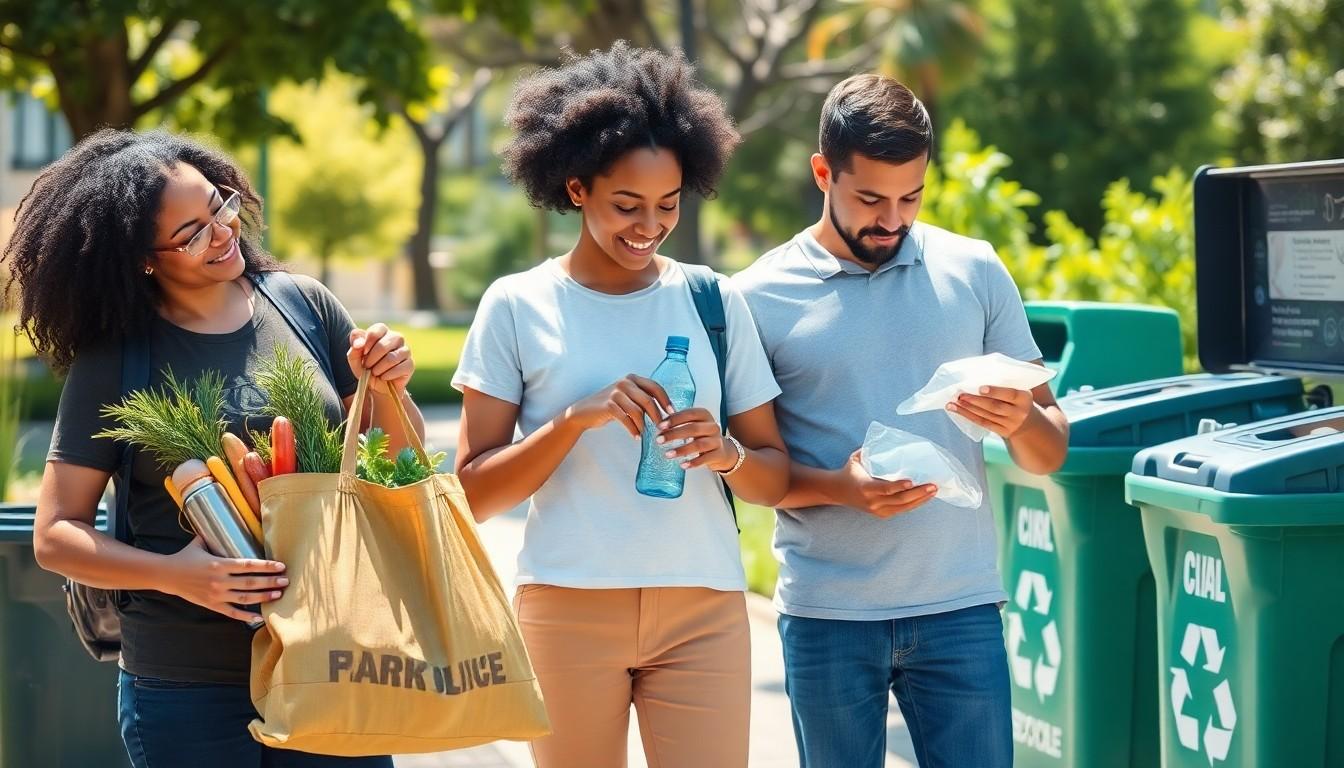In a world where plastic straws seem to multiply like rabbits and carbon footprints are the new fashion statement, sustainable living is more important than ever. It’s time to swap those guilty pleasures for eco-friendly choices that make Mother Earth smile. Imagine a life where your morning coffee doesn’t come with a side of guilt and your home is a sanctuary for both you and the planet.
Understanding Sustainable Living
Sustainable living encompasses practices that minimize environmental impact. It promotes a lifestyle that supports ecological balance through mindful consumption and energy use.
What Is Sustainable Living?
Sustainable living involves adopting habits that prioritize environmental health. It includes reducing waste, conserving resources, and opting for eco-friendly products. People engage in activities such as composting, using reusable bags, and supporting local agriculture. These choices contribute to a healthier planet. Sustainable living is not merely a trend; it represents a necessary shift toward preserving Earth’s resources for future generations.
Importance of Sustainable Living
Prioritizing sustainable living carries significant benefits for the environment and society. It reduces pollution and decreases habitat destruction caused by overconsumption. Engaging in sustainable practices fosters community resilience through local partnerships. Adoption of renewable energy sources, like solar and wind power, mitigates climate change impacts. Individuals who embrace this lifestyle inspire others to make eco-friendly choices. Sustainable living significantly enhances the quality of life for all beings by conserving vital ecosystems and natural resources.
Key Principles of Sustainable Living

Sustainable living centers around habits that protect the environment and support ecological balance. Two essential principles are reducing waste through conscious choices and maximizing energy efficiency.
Reduce, Reuse, Recycle
Reducing waste starts with assessing consumption habits. Adopting reusable items, like water bottles and shopping bags, cuts down on single-use plastics. Choosing products with minimal packaging also lessens overall waste. Reusing containers for storage or crafts helps extend their lifecycle. Recycling materials like paper, glass, and plastics conserves resources and reduces landfill overflow. Many communities offer recycling programs for easy participation. Understanding local guidelines ensures proper sorting and disposal of recyclable items.
Energy Efficiency
Energy efficiency plays a crucial role in minimizing environmental impact. Upgrading to energy-efficient appliances can reduce electricity consumption by up to 50%. Utilizing LED bulbs provides longer lifespan and lower energy use compared to traditional incandescent bulbs. Insulating homes effectively ensures consistent temperatures while reducing heating and cooling costs. Smart thermostats offer control over energy usage by adjusting settings based on occupancy. Engaging in renewable energy options, like solar panels, supports a sustainable energy future. Exploring these energy-saving measures promotes both cost savings and environmental stewardship.
Inspire Sustainable Living
Inspiring sustainable living involves collective efforts and educational outreach. Engaging communities and fostering awareness can create a significant impact.
Community Initiatives
Community initiatives play a crucial role in promoting sustainable living. They foster collaboration among residents to tackle environmental issues together. Neighbors can organize clean-up drives to remove litter from parks and waterways. Collaborating on community gardens allows families to grow their own organic produce, reducing reliance on store-bought items. Local workshops can teach skills like composting and recycling, enhancing eco-conscious behaviors. Fundraising events for renewable energy projects encourage partnerships that strengthen community resilience while supporting sustainability. Highlighting success stories from local initiatives inspires others to take action, creating a ripple effect of positive change.
Educational Programs
Educational programs significantly enhance awareness of sustainable practices. Schools can implement curricula focused on environmental stewardship, teaching students about their impact on the planet. Workshops and seminars could offer practical skills, such as water conservation techniques and waste reduction methods. Engaging families with interactive events, like sustainability fairs, can promote eco-friendly habits in a fun and approachable manner. Partnering with local experts provides residents with valuable knowledge and resources, making sustainable living accessible. Developing online platforms with tips and tutorials allows for continuous learning and sharing among community members, fostering a culture of sustainability.
The Role of Individuals in Sustainable Living
Individuals play a vital part in advancing sustainable living practices. They can significantly influence environmental health through their daily choices and actions.
Making Conscious Choices
Conscious choices lead to meaningful changes in sustainability. Selecting reusable bags instead of plastic ones reduces waste and strengthens habits. Opting for locally sourced food cuts carbon emissions from transportation. Prioritizing products with minimal packaging minimizes material use. Using public transportation or biking significantly lowers individual carbon footprints. Each decision contributes to a larger goal of reducing environmental impact.
Lifestyle Changes
Lifestyle changes foster sustainable living habits. Implementing energy-efficient appliances within the home eliminates unnecessary energy consumption. Incorporating more plant-based meals encourages a decrease in resource-intensive animal agriculture. Tackling water usage by fixing leaks and installing low-flow fixtures promotes conservation. Supporting companies with eco-friendly practices boosts demand for sustainability. Regularly participating in local clean-up initiatives strengthens community bonds and increases awareness. Each small adjustment leads to a more sustainable future.
Community Bonds
Embracing sustainable living isn’t just a trend; it’s a vital shift towards a healthier planet. Every individual can make a significant impact through mindful choices and daily actions. By adopting eco-friendly habits and participating in community initiatives, they contribute to a collective effort that fosters environmental well-being.
The journey toward sustainability starts with small changes that ripple through communities. As more people engage in practices that reduce waste and conserve resources, they pave the way for a brighter future. Together, they can inspire others and create lasting change, ensuring that Earth’s resources are preserved for generations to come.

